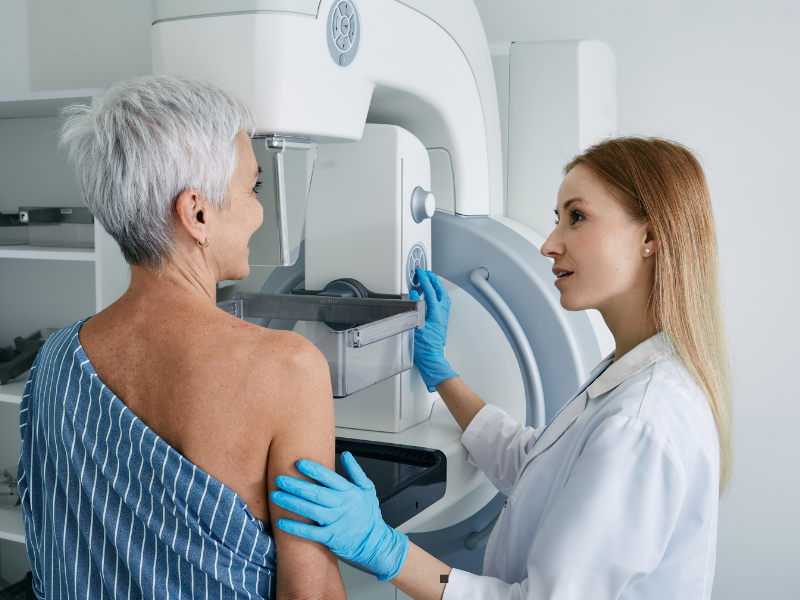Early Detection of Breast Cancer Can Prevent Negative Outcomes

Author: Brian Heckman
A private caregiver we know was telling Damey and me about several friends of hers who had been diagnosed with breast cancer over the last few years. Two were in their 60s, and another was in her early 50s, and all had been diagnosed after they had detected lumps in their breasts during self-exams and had received subsequent mammography screenings. Each had undergone life-saving treatments that ranged from chemotherapy, radiation, and even mastectomy, but all were survivors.
Damey and I also have friends who have navigated this scary journey, which is why we want to emphasize that early detection of breast cancer can prevent negative outcomes.
“Breast cancer is the most frequently diagnosed cancer in our community and the nation. Breast cancer survivors make up the largest survivor group living with cancer,” according to Aultman Breast Care Center.
Considering the prevalence of breast cancer, we are fortunate to have a nationally accredited breast care center in Canton that serves women and men throughout our community.
Aultman’s Breast Care Center is the first Stark County facility to have earned the Center of Excellence distinction from the American College of Radiology. It is fully accredited by the National Accreditation Program for Breast Centers (NAPBC), which means Aultman’s Breast Care Center exceeds all standards for quality breast care.
Their multidisciplinary medical team treats over 300 breast cancers annually. This team meets weekly to review cases to determine the best approaches to treat breast cancer based on the individual. Their multidisciplinary team consists of plastic surgeons, radiologists, pathologists, surgeons, medical and radiation oncologists, clinical trial nurses, and patient navigators.
“The Breast Care Center offers a full range of screening and diagnostic services, including 3-D mammography, high-resolution ultrasound, stereotactic breast biopsy, ultrasound core biopsy, MRI biopsy, and breast MRI. The images obtained from the exams help to screen and diagnose diseases and cancers of the breast,” they explain.
- 3-D Digital Mammography - A mammogram is a special breast X-ray that can reveal the presence of small cancers up to two years before you or your health care provider can feel them. Mammography services can also be used to detect and diagnose breast disease in women experiencing symptoms such as a lump, pain, skin dimpling, or nipple discharge.
- Breast MRI - Breast MRI uses a powerful magnet and a computer to create detailed images of the breast. Breast MRI does not replace a mammogram or breast ultrasound. It is used as a supplemental tool to diagnose abnormalities and diseases of the breast.
- Breast Ultrasound - A breast ultrasound uses sound waves to create an image of the tissue inside the breast. Because the ultrasound uses sound waves, there is no radiation exposure to the patient.
- Fast Breast MRI - This abbreviated screening MRI is recommended for women who have risk factors such as family history of breast cancer or dense breast tissue. While this test does not detect the full range of conditions that a conventional breast MRI can, it helps detect invasive malignancy in women with dense breast tissue. Like other types of screenings, a fast breast MRI may show non-cancerous lesions and lead to biopsies and other further studies.
When necessary, Aultman Breast Center also provides:
- Ultrasound core biopsy
- Ultrasound cyst aspiration
- Ultrasound lymph node fine needle and core biopsy
- Stereotactic core biopsy (mammogram-guided)
- Galactogram or ductogram
- Needle localization
The care team at Aultman Breast Care Center is committed to breast cancer prevention through risk reduction and early detection based on various screening efforts.
The US Preventive Services Task Force (USPSTF) recommends that all women get screened for breast cancer every other year, starting at age 40 and continuing through age 74, to reduce their risk of dying from this disease.
The decision to start screening mammography before age 40 should be an individual one. However, women with a parent, sibling, or child with breast cancer are at higher risk for breast cancer and may benefit more than average-risk women from beginning screening in their 30s.
Considering that breast cancer is being detected more frequently than ever in women younger than 40, it is highly recommended that women of all ages understand their risk factors, routinely perform self-exams, talk to their doctor, and get screened.
Our licensed, bonded, and insured Home Helpers® caregivers are available to provide home care, which includes safe transportation assistance to and from doctor appointments, mammograms, and other health screenings, companionship for moral support, light housekeeping, meal planning and preparation, recuperative care, along with a host of additional services to make life easier.
Damey and I are happy to schedule a FREE consultation at your convenience to discuss how our care team can provide support for you or a loved one with or without breast cancer.
Home Helpers® Canton, OH, is Veteran-owned and operated. We are honored to have received the Home Care Pulse – Best of Home Care® Provider of Choice Award, the Shooting Star Award (2011), and multiple Platinum awards for the superior level of care we provide. We are Certified Senior Advisors and members of the Home Care Association of America, Alzheimer’s Association, and International Franchise Association. Additionally, we were ranked in the Top 500 Franchises by Entrepreneur Magazine in 2019.
Home Helpers® Canton is Making Life Easier™ every day for male and female seniors in Stark County, Portage County, and portions of Summit County, including the communities of Akron, Alliance, Canton, East Sparta, Hartville, Jackson, Massillon, Navarre, North Canton, Randolph, and surrounding areas. 330.892.9329
Sources:
